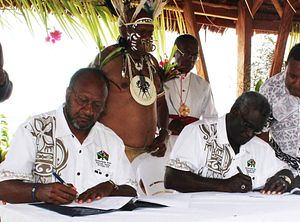The Maritime Border Treaty between the Republic of Vanuatu and Solomon Islands, signed on October 7, 2016 at Mota Lava Island in Vanuatu, has sealed the territorial boundaries between the two sovereign states. Prior to the signing, the boundaries had been under negotiations for the past 33 years.
The United Nations Law of the Sea Convention (UNCLOS) regulates maritime territories; however, there are cases where UNCLOS has fallen short from complexities resulting from overlapping maritime claims and cross-sections of delimited claims. Some such cases become hotspots for possible confrontation, such as the South China Sea issue.
The Republic of Vanuatu and Solomon Islands have been negotiating their maritime boundary for the past 33 years. The situation was complicated due to the propensity to define each party’s 200 nautical mile exclusive economic zone (EEZ) under UNCLOS. The far eastern islands in the Temotu Province of the Solomon Islands and those in the Torba Province of Vanuatu’s northwest both have the right under UNCLOS to stretch their EEZs out for 200 nm. The issue become intricate because the EEZs of both parties overlapped; that was the pressing issue.
However the terms of negotiation came to a close in November 2015 when both parties struck a deal in their final session in Honiara. This deal was the crucial point for the processes leading up to the sealing of the Mota Lava Treaty in Vanuatu. Both parties agreed to a median constructed line dividing their adjacent waters.
The significant lessons learnt from this process are worth sharing.
From an international relations perspective, the theory of constructivism points to the importance of identity in dispute settlement. Vanuatu and Solomon Islands are two sovereign countries that share common links in history and continuing to the present. Both are Melanesian countries; they share a common understanding in their language (Pidgin-Bislama); and they share similarities in their religion and cultural affiliations and practices. To some extent, both countries are neoconservatists when it comes to the Melanesian identity, advocating for peace and the well-being of Melanesians from the Papuan Region in the West and right across the Melanesian archipelago chain to Fiji in the East.
Melanesians are known for their respect toward family, a connection they cherish from their historical ancestors to the present generation. In other societies, an immediate nuclear family defines the practical connection to the concept of family. In a Melanesian society, by contrast a present group of people linking to a shared genealogy of five generations past is recognized by their blood linkages as belonging to the same family. Temotu Province of the Solomon Islands and Torba Province in Vanuatu, straddling the maritime border between the two states, share this same value; they maintain closer relations thanks to their historical and ancestral ties.
Another underlying basis for this successful dispute settlement was the high opinion given to the concept of humanity above international law and sovereignty. Both the Solomon Islands and Vanuatu agree that human beings define the concept of existence, and they value that. There is no life within a state or within international law without humanity. In Melanesia, the ethics of human existence and interaction form the backbone of society. It defines the norms and values that guide people’s day-to-day living. Coming to a conclusion to seal the Treaty was hugely influenced by this institutional tendency. The two countries have a lot to gain by maintaining the interests of the people of Temotu and Torba Provinces, beyond just the self-interest of each state. In other words, both governments have acknowledged that the people-to-people interactions and family connections between the two provinces of the two states is of the utmost importance.
Further, the will of good leaders is significant. International politics is very much shaped by the mindset of statesmen and individuals, rather than institutions. The process leading up to the Mota Lava Treaty was very much molded by the closeness and friendly relations existing between the individuals and especially the leaders of both countries. Relations are a key factor to any issue seeking solution. The friendship between individuals, the jokes and laughter that they share, the Kava that they drink together, the betel nuts that they chew together are all contributing variables in influencing decisions. Further, both prime ministers have expressed clearly the necessity of promoting peaceful coexistence, and the need to enhance closer cooperation between the two states in their developmental aspirations. This joint view unquestionably paved the way for both countries to finally come to the table and register their maritime border on the map.
Finally, there is always a right timing for things to unfold. This is an understanding that one needs to bear in life. The 33-year period of negotiations was a walk of effort, wisdom, and patience. There are always issues of concern to society and humanity, but things that we cannot solve today should be set aside for our future generations to deal with it. The evolution of changes that runs through society has its timing for everything.
The Solomon Islands and the Republic of Vanuatu have achieved a milestone accomplishment. Their efforts over the past 33 years have been positive. They never encountered any direct confrontation, as diplomacy took its course optimistically, with both talking and working influenced by the “wantok nature” understood through the prism of social constructivism. The efforts to thrive and maintain peaceful coexistence were genuinely accepted by both states. Respect for humanity was at the forefront of the issue, and the courage and wisdom displayed by their leaders ensures that peace, unity, harmony, and prosperity are maintained between the two Melanesian states.
The world has to realize that dispute settlement made truly for the betterment of humanity, in its practical sense, is highly likely to succeed. Long live the relationship between the Solomon Islands and Vanuatu and the greater Melanesia as a whole.
Walter Diamana is a Foreign Service Officer in the Ministry of Foreign Affairs and External Trade of the Government of Solomon Islands.

































